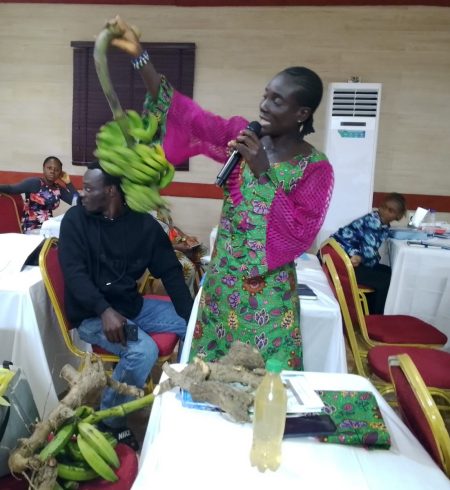03 March 2013, Sweetcrude, ABUJA – The Chairman of the Presidential Task Force on Power (PTFP), Engr. Beks Dagogo-Jack has urged Nigerians to be patient with the pace of the power sector reforms, noting that due to complexity of the situation, it cannot be resolved even in the next five years.
Dagogo-Jack, who was speaking at the fifth Board meeting of the Presidential Task Force on Power held last week, justified the launch of the Power sector Reform Roadmap 2.0, stressing that the need for effective transition in the sector made a review of the original document imperative.
He stated that, “The road to power adequacy in Nigeria has been a tortuous journey, given the history of past failures and obstacles that continues to exist in the sector up to date. It can not and will not be fully resolved in just 2, 3 or even 5 years.
He added that, “However, it is not an insurmountable challenge and remains very attainable. Roadmap 2.0 is the sector managers’ due diligence initiative to ensure the continued integrity of our planning projections and to bring the revised version into better alignment with emerging realities as we set the stage for the transition of the electricity industry to full market mode.”
The Chairman of PTFP explained “We have been tasked by President Jonathan with the very tall order of giving Nigeria adequate electricity through the development of a sustainable and properly regulated power market in the life of this administration. This is the biggest power sector reform exercise in Africa by a very wide margin and ranks amongst the top five in the world in terms of the sheer size of the market and process complexity.
“Therefore every step is a learning curve for us. We urge Nigerians to support our efforts and through their vigilance join us to fight the entrenched interests which work at several layers to frustrate the reform.”
The Chairman stated that the roadmap review exercise is a fundamental technical requirement any responsible reform driving agency must embark on as the nation approaches the final stages of the activity/time projections captured in the 2010 version of the Roadmap.
He noted that the 2010 version remains the anchor upon which everything so far achieved in the reform has rested.
According to him, a reform roadmap is more of a sector development strategy and project delivery tool structured as a rolling plan rather than a mere political or campaign document anyone can tinker with or comment upon.
“Accordingly, it is imperative that the key outstanding targets in the Roadmap must be current and not outdated. Also in the revision process, achieved milestones are rolled off, slipped milestones are reset, and even brand new milestones not previously captured are rolled on,” he stated.
The eventual outcome of this revision, he noted, would produce new validated parameters to serve as a current guiding tool for the industry and market such that even would-be investors can rely on the current data captured in the revised Roadmap as primary data, adding that to describe such a due diligence process a policy somersault is patent misunderstanding of the facts.
Dagogo-Jack added that, “The proposed Roadmap 2.0 will retain all the benchmarks of the original one, will capture the missed targets, review outstanding ones and re-evaluate scopes while also addressing issues of fuel diversity, impact of technology on renewables pricing, developing long-term financing models for transmission investments, and a strategy for closing the gap between the projected sector expansion and the required technical manpower capacity to operate this growth.”
Engr. Dagogo-Jack further remarked that “for anyone to describe such a technically sound and judicious initiative as tantamount to policy reversal or somersault, is not only mischievous, but is a calculated attempt to denigrate the offices and persons of those of us working so tirelessly to overcome where several have failed in the past. Nigerians should please exercise restraint and resist the urge to cheaply politicise developments in a sector as basic and critical as electricity.”
Speaking further on the recent trend of blackouts, especially in Abuja and other high demand centres, the PTFP Chairman noted, “Let’s face it, with our population of over 160 million people living in over 25 million households, the current available peak power of 4500MW is just a tiny drop in the ocean.
“This is why we are having the blackouts. The load shedding which is increasing lately has its origins in the fact that once consumers witnessed increasing supply and reliability, previously suppressed or migrated demand started returning to the grid. People who used to only put one air-conditioning unit at their homes when using their small generators now put on all units at home.
“Our grid operators and the National Control Centre are doing their best to reduce incidents of system collapses arising from unplanned sudden ramp up of grid load from returning suppressed or migrated demand.”
He continued “To be clear, we have quite a lot of planned and ongoing projects at both the TCN and the NIPP aimed to alleviate much of this grid constraints from the third quarter of this year. It is very important to state here that Nigerians should measure us (who are the sector managers) on the delivery of the projects which will unlock both the equipment and the market constraints that will lead to sustainable increase in power supply. I consider it an unnecessary and wasteful indulgence in self-delusion for anyone to want to judge us on the expectation of a 24 hour supply nationwide with only 4500MW on our grid today.”
Engr. Dagogo-Jack assured Nigerians that the government of President Goodluck Jonathan shall prevail against “all the daunting obstacles on the way which have overwhelmed several past governments and shall take Nigerians to the promise land.”




